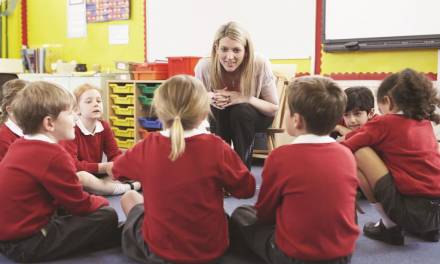Every pupil can benefit from Government school funding – with schools set to receive a £4.8 billion boost in 2021 compared with 2019.
The school funding settlement is worth a total of £14.4 billion over three years – the biggest increase in a decade.
How will the funding work and how does it link to catch up premium? This blog post explains.
How does the Government school funding work?
The school funding, the Government says, will “level up education funding and give all young people the same opportunities to succeed, regardless of where they grow up or go to school.”
Funding is being allocated through the transformative national school funding formula, which ensures schools from the largest city secondaries to the smallest community primaries are allocated funding more fairly to meet their pupils’ needs. The Government says, “this has replaced the unfair and outdated previous system. where schools with similar characteristics received very different levels of funding with little or no justification.”
Two thirds of local authorities are now allocating their funding based on the national funding formula.
Every secondary school will attract a minimum of £5,150 per pupil and each primary school will receive is a minimum of £4,000 per pupil under the national funding formula from 2021, up from the £5,000 and £3,750 which schools are receiving this year (in the first year of the funding settlement).
What have the Prime Minister and Education Secretary had to say?
Prime Minister, Boris Johnson, said:
Every child deserves a superb education – regardless of which school they attend, or where they happened to grow up.
That is why we are providing additional funding now and for the future for every school – with those historically underfunded receiving the greatest increase.
I want to again thank teachers, childcare workers and support staff for the brilliant work they have done throughout the pandemic, and for the preparations underway to welcome back all children from September.
Our £1 billion covid catch-up package, on top of these increases in per pupil funding, will help headteachers support those who have fallen behind while out of school, and deliver a superb education for all children across the country.
Education Secretary, Gavin Williamson, added:
This year has been incredibly challenging for schools, teachers, and students due to the Covid-19 outbreak, with everyone working in education going to incredible lengths to support children and ensure they can get back to the classroom.
Not only are we confirming another year of increased and better targeted funding for our schools, but with our transformative national funding formula we are making sure the money is distributed fairly across the country so all schools can drive up standards. With two thirds of local authorities now having moved towards the national funding formula, it is time for he remainder to follow suit and ensure fairness for every child.
Our £1 billion Covid catch up fund comes on top of this £14.4 billion three-year school funding boost, meaning that this Government is leaving no stone unturned in levelling up opportunities for every young person, up and down the country.
How does this link to Covid catch-up?
The Government also confirmed that allocations from the £650 million catch-up premium, one part of the overall £1 billion Covid catch-up package, will be based on the number of pupils and paid once a term over the 2020/21 academic year. A 1,000 pupil secondary school will receive £80,000 and a 200 pupil primary school will receive £16,000 to tackle the impact of lost teaching time on pupils as a result of the coronavirus pandemic.
The schools’ headteachers can decide how best to use the premium allocation in order to tackle the impact of lost teaching time on pupils. They are encouraged to spend it on evidence-driven approaches including small group or one-to-one tuition, support over summer or additional teaching support.
A £350 tutoring fund is also available for disadvantaged pupils.
The National Tutoring programme will also provide support for disadvantaged pupils aged 5-16 in two ways: schools in all regions will be able to access heavily subsidised tuition from organisations on a list of approved partners, while some of the most disadvantaged schools will be supported to employ in-house academic mentors to provide intensive support to pupils.
Who is eligible for catch up premium?
The £650 million universal catch up funding will cover:
- Primary, secondary and all through local authority-maintained schools, academies and free schools
- Local authority-maintained special schools
- Special academies and free schools
- Special schools not maintained by a local authority
- Pupil referral units
- Alternative provision (AP) academies and free schools
- Local authority-maintained hospital schools and academies
- Independent special schools
Local authorities will be provided for pupils with education, health and care (EHC) plans who are educated in independent special schools based on the number of these pupils in their area.
How is school funding allocated?
Schools’ allocations will be calculated on a per pupil basis – with mainstream school provided with a total of £80 for each pupil in reception through to Year 11.
Special, alternative provision and hospital schools will be provided with £240 for each place for the 2020 to 2021 academic year.
A typical primary school of 200 pupils, the funding means, will receive £16,000. A typical secondary school of 1,000 pupils will receive £80,000.
The funding will be provided in 3 tranches.
Schools will be provided with an initial part payment in autumn 2020, based on the latest available data on pupils in mainstream schools and high needs place numbers in special, AP, hospital schools and special schools not maintained by a local authority.
A second grant payment will be distributed in early 2021, based on updated pupil and place data. A 4-15 pupil headcount from the October 2020 census will be used for mainstream schools.
For special, AP and hospital schools, the Government will use the following:
- 2019 to 2020 academic year place numbers from the published local authority 2019 to 2020 financial year budget returns for local authority-maintained schools
- The published high needs place numbers for 2020 to 2021 academic year for academies and special schools not maintained by a local authority
The second grant payment will also take account of the initial part payment made in autumn 2020 so that schools will receive a total of £46.67 per pupil or £140 per place across the first 2 payment rounds.
A further £33.33 per pupil or £100 per place will be paid during the summer term (2021).
Read more: School catch up – everything you need to know
How should funds be used?
Schools should use funding in order to support pupils in order to catch up for lost teaching, in line with guidance on curriculum expectations for the next academic year. However, schools have flexibility to spend their best way for their cohort and circumstances.
The Education Endowment Foundation has published a guide for schools to make the best use of their funding. Including:
- Small group or one-to-one tuition (particularly through the National Tutoring Programme)
- Summer programmes to help re-engage pupils or extra teaching capacity from September
School leaders must be able to account for how this money is being used in order to achieve a central goal of getting schools back on track and teaching a normal curriculum as soon as possible.
How EDClass can help with student catch up
EDClass provides 11,000 lessons in though our online virtual classroom in order to help students catch up.
A tailored learning platform means you students can undertake lessons suitable for them, with instant assessment feedback to help them with strengths and weaknesses.
Further, a sophisticated tracking system means your teachers can monitor performance.
Safeguarding is EDClass’ number one priority with a range of features: alert mechanisms, instant chat, eyes-on learning and all EDClass staff are enhanced DBS assessed.
You can read our Ofsted report here.
For more information call 01909 568 338.










